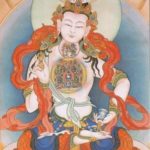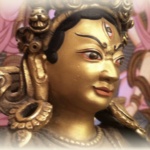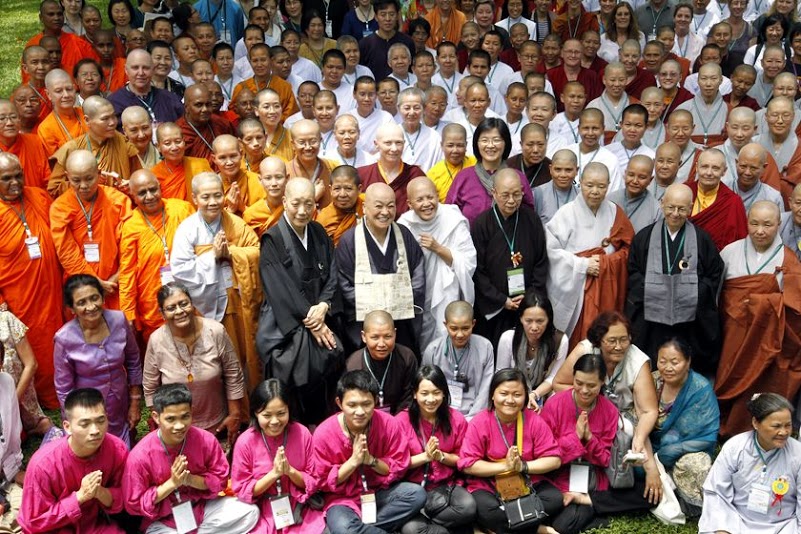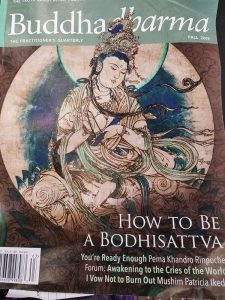Pema Khandro will be presenting at the International Buddhist Women’s Conference in Hong Kong. The Conference begins tomorrow, June 22, 2017. It is organized by Sakyadhita International which is a worldwide organization devoted to benefiting Buddhist women around the world. Since its inception in 1987, it has participated in positive changes to empower women around the globe. The organization and its conferences promote dialogue, harmony, and connection among Buddhist women from different traditions throughout the world. It has over two thousand members in forty-five different countries.
This year’s conference is held in Hong Kong. The theme this year is “Contemporary Buddhist Women: Contemplation, Cultural Exchange & Social Action.”
Pema Khandro Rinpoche’s will be presenting at the conference on Sunday. Her presentation will focus on patterns of the development of women’s identity in Tibetan biographies. The presentation is entitled, “Becoming Vajrayogini, Buddhist Women’s Self-Esteem without Self.” It examines the philosophical precedents for concepts of identity development. The following is a short excerpt of a translation from a text she will discuss.
“For without dharma holders, who will have fortitude? The Buddhists who put Dharma into practice… should not hold the view that men are superior and women are inferior. Now and future generations should look up to these great women and embrace them as models. Then, whatever activities they do, whether dharmic or worldly, they will never be discouraged. They will be brave. They will endure. In this state they will accomplish their vows.1“
For more details about the conference visit http://sakyadhita.org/conferences/15th-si-con.html
For more information about becoming a member of Sakyadhita International – visit:
http://sakyadhita.org/home/joinus.html
Foot Notes:
- In English, the title is, “Garland of White Lotuses: The Liberation Stories of Great Female Lives in Tibet.” In Tibetan, it is “Phags bod kyi skyes chen m dg gi rnm par thar ba pd+m dkar po’i phreng b pod dang po bzhugs so.” (Garze: Bla rung arya tare’i dpe tshogs rtsom sgrig khang, 2013).





 “What we see in the female buddha’s life story is that the path to buddhahood is not a perfect linear progression from a totally ignorant, karma-covered being to a fully awakened buddha. One’s identity oscillates along the way. What does not oscillate in Yeshe Tsogyal’s story, what remains constant throughout her training, maturity, and fully blossomed buddhahood, is that at all times she acts unwaveringly with the motivation to benefit others. This clarifies any questions about how an ordinary being can navigate the ambiguity of wisdom and confusion that characterizes our mental states. Our center of gravity and our guiding light is bodhichitta, our own altruistic motivation and enlightened intent. “May all beings everywhere be free from suffering”—this is not just a pie-in-the-sky wish that this will happen eventually. It is an explicit assumption of universal responsibility, a declaration that we ourselves will actively help make such benefits possible—beginning with taking responsibility for our own spiritual awakening. But who among us feels worthy of helping other beings right now? Of course Buddha could help people—he was enlightened. Of course Yeshe Tsogyal can help infinite beings—she’s gone beyond anger and grasping. But what about us? At what point in our development does the bodhisattva mandate kick in?” To read the full article click here –
“What we see in the female buddha’s life story is that the path to buddhahood is not a perfect linear progression from a totally ignorant, karma-covered being to a fully awakened buddha. One’s identity oscillates along the way. What does not oscillate in Yeshe Tsogyal’s story, what remains constant throughout her training, maturity, and fully blossomed buddhahood, is that at all times she acts unwaveringly with the motivation to benefit others. This clarifies any questions about how an ordinary being can navigate the ambiguity of wisdom and confusion that characterizes our mental states. Our center of gravity and our guiding light is bodhichitta, our own altruistic motivation and enlightened intent. “May all beings everywhere be free from suffering”—this is not just a pie-in-the-sky wish that this will happen eventually. It is an explicit assumption of universal responsibility, a declaration that we ourselves will actively help make such benefits possible—beginning with taking responsibility for our own spiritual awakening. But who among us feels worthy of helping other beings right now? Of course Buddha could help people—he was enlightened. Of course Yeshe Tsogyal can help infinite beings—she’s gone beyond anger and grasping. But what about us? At what point in our development does the bodhisattva mandate kick in?” To read the full article click here –